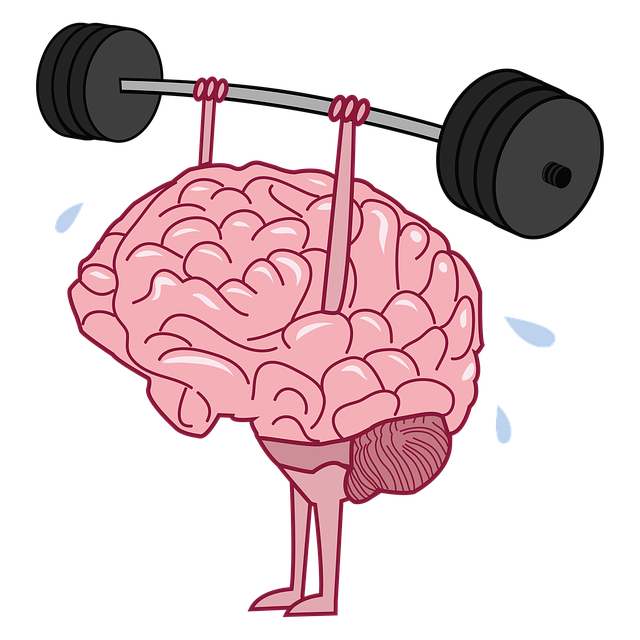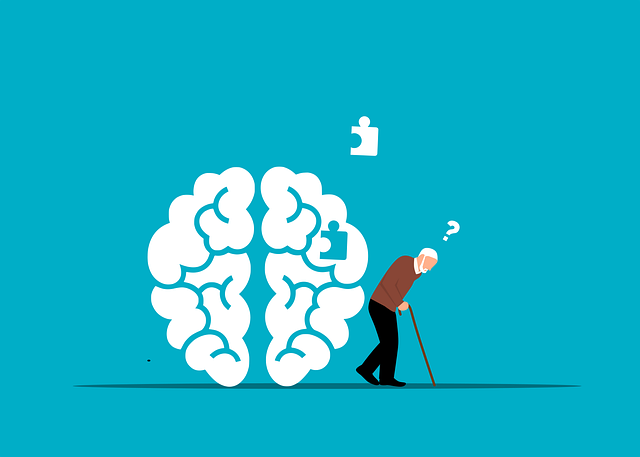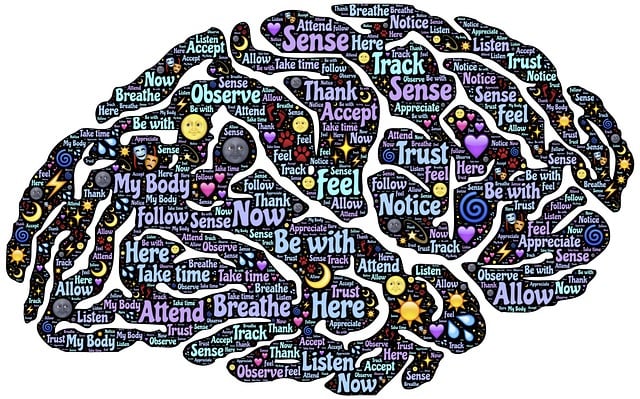Healthcare's cultural competency is crucial for inclusive care, valuing diverse patients' unique backgrounds. Golden Interpersonal Issues Therapy (GIIT) trains providers to navigate sensitive conversations, respecting cultural traditions and improving treatment adherence. This approach tackles emotional disparities through compassion and inner strength, enhancing patient satisfaction and outcomes. Unaddressed cultural barriers lead to poor healthcare access and quality. GIIT's emphasis on sensitivity, coupled with mental wellness promotion, fosters trust and positive relationships. Effective training requires nuanced focus on bias, cross-cultural communication, and systemic understanding, using structured learning frameworks. Success is measured by behavioral shifts, attitudes, and skills development, with ongoing support for consistent application in diverse settings. Community outreach integration ensures real-world benefits, improving healthcare delivery within diverse communities.
Healthcare provider cultural competency training is an essential component of delivering effective and equitable care. In a diverse society, understanding cultural nuances can significantly impact patient outcomes. This article explores the critical role of cultural competency, highlighting the potential consequences of unaddressed cultural barriers. We delve into ‘Golden Interpersonal Issues’—cross-cultural communication strategies—and provide insights on designing, implementing, and evaluating training programs. By fostering competent healthcare providers, we ensure better patient experiences and improved health outcomes.
- Understanding Cultural Competency in Healthcare: A Foundation for Effective Care
- The Impact of Unaddressed Cultural Barriers on Patient Outcomes
- Golden Interpersonal Issues: Facilitating Cross-Cultural Communication
- Designing and Implementing Training Programs for Healthcare Providers
- Measuring Success: Evaluation and Continuous Improvement Strategies
Understanding Cultural Competency in Healthcare: A Foundation for Effective Care

In healthcare, cultural competency goes beyond mere awareness; it’s about creating an environment where diverse patients feel understood and respected. This involves recognizing and appreciating the unique cultural backgrounds, beliefs, and values of individuals, which significantly impact their health experiences and outcomes. Cultural competency training equips healthcare providers with the skills to navigate sensitive interpersonal issues therapy, fostering effective communication and building trust. By understanding a patient’s cultural context, providers can tailor care that aligns with their traditions and practices, ensuring better adherence to treatment plans.
The foundation of this approach lies in developing compassion cultivation practices and strengthening one’s inner strength development. Healthcare professionals must be adept at managing complex emotions, including those arising from cultural disparities, through effective emotional healing processes. This not only enhances patient satisfaction but also leads to improved health outcomes by promoting open dialogue and collaborative decision-making. Ultimately, cultural competency training enables healthcare providers to offer more personalized, compassionate, and culturally sensitive care.
The Impact of Unaddressed Cultural Barriers on Patient Outcomes

Unaddressed cultural barriers can significantly impact patient outcomes in healthcare settings. When interpersonal issues stemming from cultural differences are left unaddressed, it leads to a range of negative consequences for both patients and providers. Patients may experience reduced access to care, lower quality interactions with healthcare professionals, and potentially poorer health outcomes as a result. For instance, language barriers can hinder effective communication, leading to misdiagnoses or improper treatment plans. Similarly, cultural misunderstandings can foster mistrust, causing patients to avoid seeking necessary medical attention or adhering to prescribed therapies.
Golden interpersonal issues therapy emphasizes the importance of cultural sensitivity in mental healthcare practice, incorporating emotional well-being promotion techniques and mood management strategies tailored to diverse patient backgrounds. By integrating these approaches, healthcare providers can improve their ability to connect with culturally diverse individuals, fostering a more inclusive environment that supports positive patient outcomes. Effective cross-cultural communication skills not only enhance the quality of care but also contribute to the overall satisfaction and emotional well-being of patients from various cultural backgrounds.
Golden Interpersonal Issues: Facilitating Cross-Cultural Communication

Effective cross-cultural communication is a cornerstone of quality healthcare, and addressing Golden Interpersonal Issues Therapy (GIIT) is essential in this process. Healthcare providers interact with patients from diverse backgrounds, cultures, and beliefs daily, making cultural sensitivity a vital skill. GIIT focuses on understanding and bridging these differences to enhance patient care and outcomes. By fostering open dialogue, listening actively, and demonstrating empathy, healthcare professionals can create an environment of trust and respect.
This approach not only improves the patient-provider relationship but also promotes better health outcomes. Mental wellness, confidence boosting, and stress management are interconnected with cultural competency. When providers are adept at navigating cross-cultural interactions, they can help patients feel heard, reducing stress levels and encouraging them to seek necessary care without hesitation.
Designing and Implementing Training Programs for Healthcare Providers

Designing effective training programs for healthcare providers involves a nuanced approach to address complex interpersonal issues that often underpin various patient interactions. These programs should be tailored to foster cultural competency, ensuring providers can navigate diverse patient backgrounds and needs with sensitivity and expertise. The process begins by identifying key areas of focus, such as bias recognition and mitigation, cross-cultural communication skills, and understanding the impact of systemic barriers on patient care. Incorporating evidence-based practices like Golden Interpersonal Issues Therapy can equip healthcare professionals with tools to enhance self-esteem improvement, mood management, and emotional regulation in both personal and professional settings.
Implementing these training programs requires a structured yet flexible framework. Interactive workshops, case studies, role-playing scenarios, and group discussions all contribute to immersive learning experiences. Regularly updating the curriculum to reflect evolving cultural landscapes and healthcare trends is essential. Moreover, ongoing support and mentorship post-training can reinforce learned skills and promote their consistent application in diverse clinical environments. By prioritizing continuous education and skill development, healthcare providers are better equipped to offer compassionate, culturally sensitive care that respects and values patient autonomy and dignity.
Measuring Success: Evaluation and Continuous Improvement Strategies

Measuring success is a vital component of cultural competency training for healthcare providers. Evaluation strategies should go beyond simple knowledge assessments to capture the deeper shifts in attitudes, behaviors, and interpersonal skills required for effective cross-cultural interactions. This includes assessing changes in communication styles, empathy levels, and comfort addressing sensitive golden interpersonal issues therapy topics.
Implementing robust evaluation methods, such as pre- and post-training surveys, focus groups, and observations, allows for a comprehensive understanding of the program’s impact. Continuous improvement is fostered through feedback analysis, identifying areas needing refinement, and incorporating relevant practices like compassion cultivation techniques and self-esteem improvement exercises. Additionally, integrating community outreach program implementation as an outcome measure ensures that training translates into real-world benefits, fostering stronger connections and improved healthcare delivery within diverse communities.
Healthcare provider cultural competency training is not just a nicety, but an essential tool to address cultural barriers and improve patient outcomes. By focusing on key areas such as understanding cultural competency, identifying interpersonal issues in cross-cultural communication, designing effective training programs, and measuring success through evaluation, healthcare organizations can foster more inclusive environments. Golden Interpersonal Issues Therapy plays a pivotal role in facilitating these interactions, ensuring that patients from diverse backgrounds receive the highest quality care. Ultimately, continuous improvement strategies based on robust evaluations are crucial to maintaining and enhancing cultural competency among healthcare providers.














